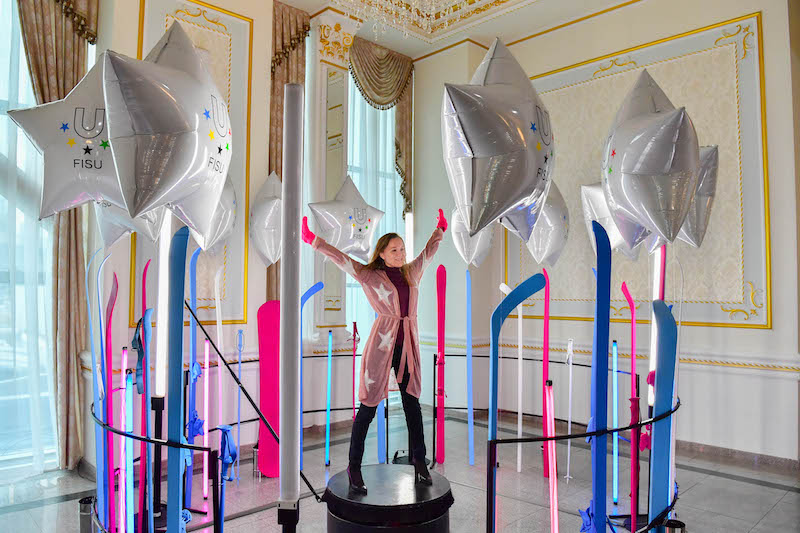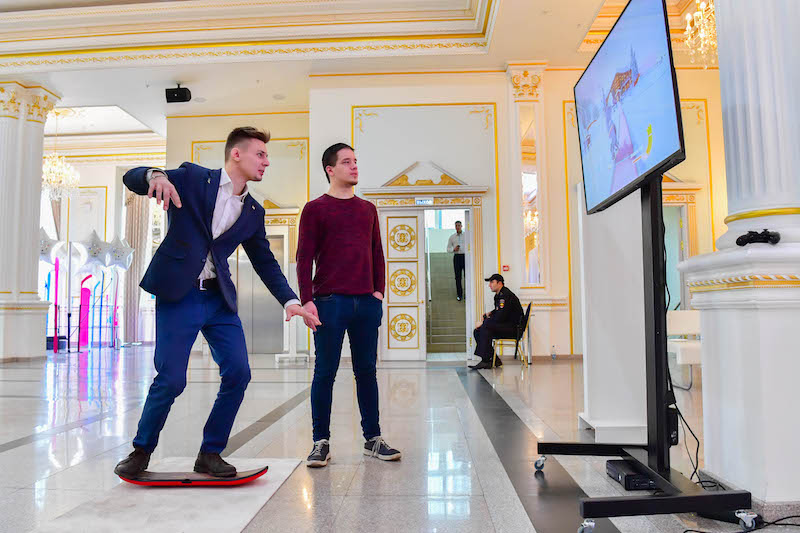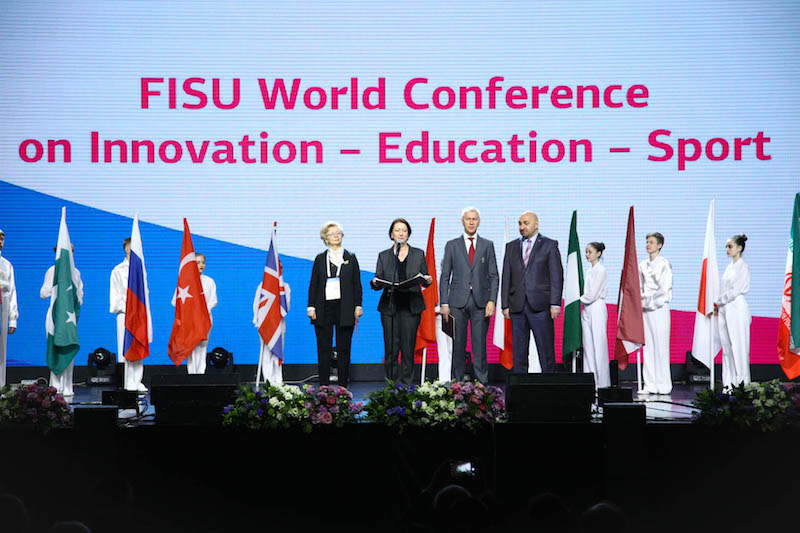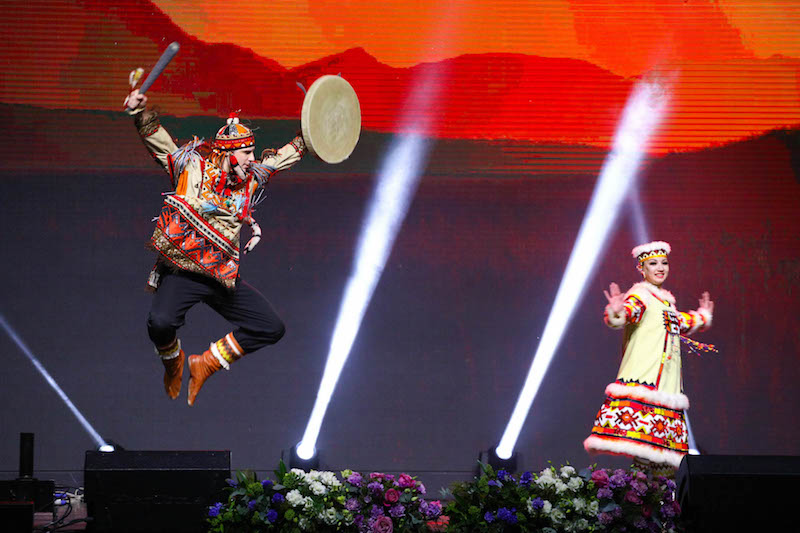A number of scientific innovations in the field of sports were exhibited during the FISU World Conference on Innovation – Education – Sport at Krasnoyarsk. The World Conference brought together young scientists, academics and sports persons to discuss latest technologies and sustainable development of winter sports.
 KRASNOYARSK, Russian Federation – The second edition of the FISU World Conference on Innovation, Education and Sport took place in Krasnoyarsk, Siberia, from 5-7 March 2019, alongside the Winter Universiade 2019 and brought forth a host of innovations that could chart the path for sports in the future.
KRASNOYARSK, Russian Federation – The second edition of the FISU World Conference on Innovation, Education and Sport took place in Krasnoyarsk, Siberia, from 5-7 March 2019, alongside the Winter Universiade 2019 and brought forth a host of innovations that could chart the path for sports in the future.
The event drew about 450 delegates from Russia, Europe, Asia and Africa and opened with a traditional dance performance from the Krasnoyarsk region as well as a flag parade of 19 participating nations.
FISU President Oleg Matytsin opened the proceedings by saying, “The Conference will give a push to students of sports science and will highlight the importance of youth culture.”
The Vice-Minister of Sports of the Russian Federation, Natalia Parshikova, was also present and she said, “We can see the ideals that university sport brings to the world’s sports community. We can see happiness in the eyes of the Universiade athletes, because it’s the happiness of participation that counts here.”
The Conference programme included plenary sessions, panel discussions, parallel meetings and round tables, in addition to the Innovation Expo that was part of the pioneering theme of this edition. This included a start-up contest to promote sports science and foster innovative entrepreneurship among students and young researchers.
 The FISU World Conference at Krasnoyarsk 2019 Winter UniversiadeSome of the innovations on display included ice-hockey training simulators, bandy sticks made of composite materials using nano-technology, clothing for extreme sports and skin protection for winter conditions based on cryoprotectants (natural compounds).
The FISU World Conference at Krasnoyarsk 2019 Winter UniversiadeSome of the innovations on display included ice-hockey training simulators, bandy sticks made of composite materials using nano-technology, clothing for extreme sports and skin protection for winter conditions based on cryoprotectants (natural compounds).
Visitors were able to experience some state-of-the-art athlete technologies first-hand including: compact DNA test that helps in developing personalised recommendations for nutrition and sports activity; software for coaches that collects statistics for each exercise and activity during the training session and a diagnostic test system which allows assessment of an athlete’s performance based on an instant saliva test.
The plenary sessions and parallel sessionscovered the three main topics of this year’s Conference:
-
Innovation for developing human capital & resources in sport
-
Innovation and new technologies in sport
-
Innovation for Universiade legacies: Looking ahead to the future through the present
IOC Education Committee member Thierry Zintz discussed innovation in the management of governing bodies and said, “innovation occurs when people and institutions cooperate to create new concepts. The ability to innovate is a core need in sports organisations.”
Claude Stricker, former Winter Universiade alpine skier and current Director of AISTS – the world’s number one ranked master’s level sports management programme – focused on legacy and sustainability of events, which have to take into account three main aspects: environment, society, transport. “The aspect of legacy is embedded right from the very beginning of the bidding process and has to aim for a long-term effect,” said Stricker. “Climate change has created a new challenge for winter games.”
 Other speakers at the Conference included Olesya Nedvetskaya of the University of Cardiff and vice chancellor of the university of Johannesburg Tshilidzi Marwala, who is also a member of the FISU Academic Advisory Board. All the speakers emphasized the strong link between sports, science and education, which must be reinforced by culture.
Other speakers at the Conference included Olesya Nedvetskaya of the University of Cardiff and vice chancellor of the university of Johannesburg Tshilidzi Marwala, who is also a member of the FISU Academic Advisory Board. All the speakers emphasized the strong link between sports, science and education, which must be reinforced by culture.
Chair of the FISU Education Committee, Dr Verena Burk highlighted that scientific research is one of the main drivers of sustainable development and legacy and must therefore be supported by investment. “The main focus should be on the role of innovation in this process and enhancing of citizen participation,” she said.
However, when discussing innovation, she also said, “It is important not to forget the risks, dangers and challenges that are connected with it. If innovations in the field of science and technology have proven beneficial in many ways in the sports world, the ethical and legal paradigm it shakes must also be taken into consideration.”
For this, Dr Burk said, governing bodies and organising committees need to commit to long term studies and research. This ties in with FISU’s aims to have active partnerships with academies, scholars and universities around the world.
The biggest takeaway from the 2019 edition of the FISU World Conference in Krasnoyarsk was that participation in a sports event like the Universiade leaves a lasting impact on individuals; be it athletes, organisers, speakers or volunteers. Anyone involved with a sports event the scale of a Universiade benefits greatly from the life-altering experience.
The FISU World Conference on Innovation, Education Sport is one of the pillars of the FISU Educational programme, and exemplifies the FISU motto of ‘Today’s Stars, Tomorrow’s Leaders’. All athletes, coaches and officials are invited to attend the FISU World Conference. FISU’s next major educational event is the FISU Forum, which will take place next year in the Hungarian capital of Budapest.
